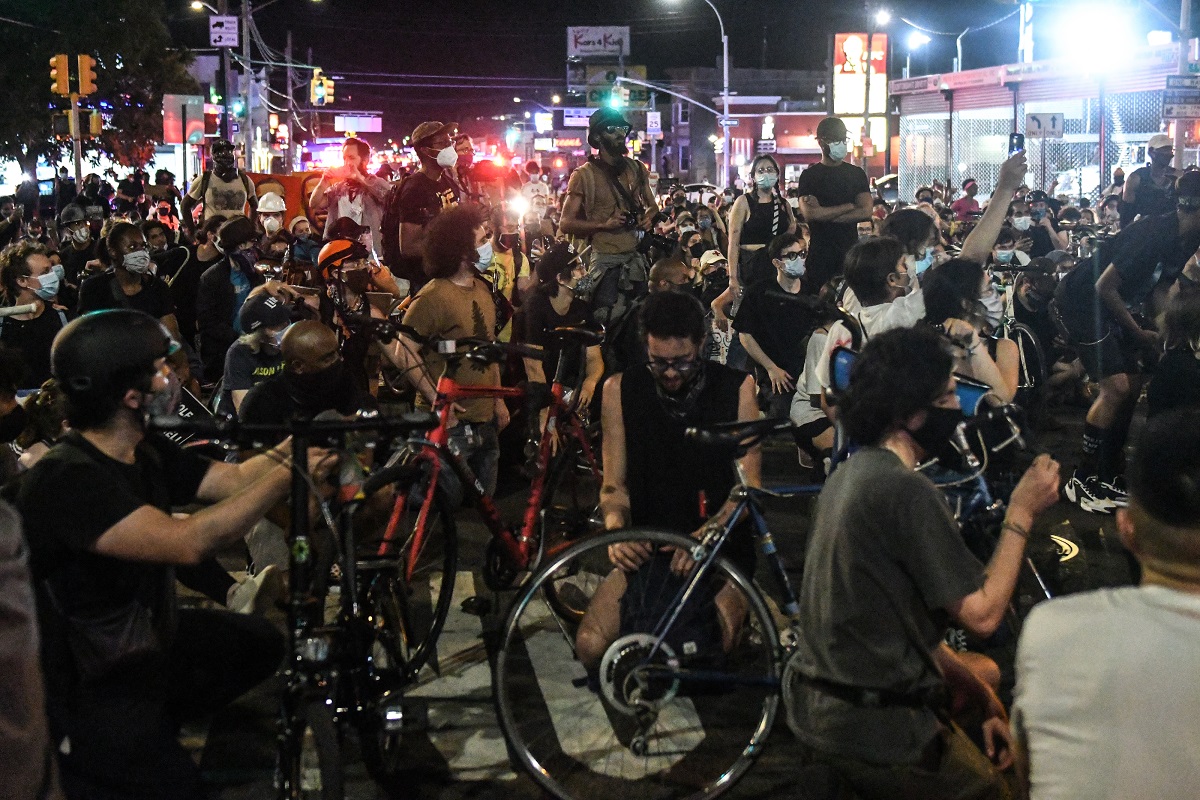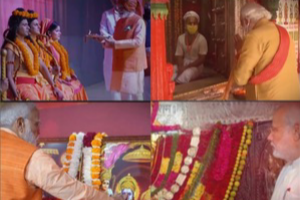As I write this, there are thousands of protestors right outside my work-from-home desk – in London’s Hyde Park. If I open the windows, I can probably hear them but it is a damp, grey day and I don’t want to feel cold, in addition to feeling gloomy. The crowds carry placards saying ‘Black Lives Matter’ and social distancing seems to have been sacrificed at the more sacred altar of solidarity.
London stands united with the American people in their grief and anger at the horrific killing of George Floyd, an unarmed black man in the US. I wonder whether there are any British Indians in that crowd. Whether any of my Facebook friends who have promptly adopted the ‘Black Lives Matter’ frame for their profile photos have made it there in London’s cold and damp – standing shoulder to shoulder with their black brothers and sisters and their white friends.
If I were to hazard a guess, probably very few. I use the term ‘black brothers and sisters’ with a lot of careful thought. As Indians living in the UK, we are clearly a non-white race living in a white country. We are not black yes, but we are people of colour. We look different, whether we like it or not. This fact was something I woke up to 30 years ago when my little daughter emerged from the school door, hand in hand with a white classmate.
Even with the school uniform on, she was well… different. Under the chocolate brown felt hat and above the yellow striped tie, there was a brown face! All my delusions about being white (we are a Kashmiri family and very lightskinned by Indian standards), went out of that school door. In that sea of strawberries and cream and blonde hair, my daughter was different, I could spot that from the school gate.
The subtle gradation of colour that made us almost white in our own eyes and those of other Indians did not exist. We might be beige, brown or burnt sienna but we are non-white. And nowhere is that more apparent than in white countries. This is the primary reason why non-Indians can never tell the subtle gradations of skin colour that we Indians are so good at spotting.
Ask any NRI – the first time they realise that white people are colour blind to fair and dark-skinned Indians, it is a huge shock and, in my case, a humbling experience. After a lifetime of being called ‘gora’ (white), I was suddenly not! Deluded I may have been, but I was a good learner. I never forgot that lesson at the school gate and from that day on – I functioned accordingly. In terms of empathy with racism of any kind, in terms of protest against injustice and most importantly, in terms of self-perception.
In fact, when I was writing my book about bringing up children outside India, I decided to write a whole chapter about racism that the publisher felt had no place in a book that dealt with mostly positive subjects like education, marriage and family life. Yes, it is indeed a touchy subject which some NRIs do not acknowledge, while others think applies to ‘’other Indians” and not to them.
However, I believe it is an important issue that we Indians, as people of colour, must have a standpoint on and I convinced my publisher accordingly. The tragic death of George Floyd has provided us with yet another occasion to confront our own race and identity. So why don’t most NRIs acknowledge racism? Part of it is the immigrant personality. Like all risk-takers, they are genetically predisposed to think in positive terms.
Their decision to leave their mother country has to be ratified by the greater economic well-being of the family and the superior education of their children – hey, even the presence of 30 different kinds of breads in the aisle in the supermarket is enough to feed into the self-congratulatory mode the NRI lives in. Where is the time to dwell on negatives like racism which are often covert gestures anyway?
Last to get served in a restaurant? Could be a coincidence. Children having trouble making friends in school? Maybe they are shy. The list of excuses is long and endless. Racism is firmly brushed under the Kashmiri carpet in most NRI households. Also weighing in on this grand delusion is the complex hierarchical mind-set that is part of our culture. We Indians do not think in black and white terms (pun intended), there are all sorts of subtle gradations that figure in our self-perception; so we are Indians yes, but we are not black.
Brown at best, or wheatish, as the matrimonial ads put it. So racism does not apply to us. We are used to looking at ourselves through other Indian eyes which weigh up colour, caste, community, privilege in one micro-second and process them along various axes to arrive at a result. Most NRIs do not realise (which I did long years ago, at the school gate) that non-Indians are not used to thinking like us – they can only process white or non-white.
It is about time we stop kidding ourselves about not being black or thinking that racism happens to other people, poorer than us, less educated than us and blacker than us. Think of Indians in Australia being killed, think of Sikhs being attacked in the US after 9/11 because they were mistaken for Muslim terrorists, think of Indian computer engineers being denied visas – yes racism is alive and well and just by closing our eyes to it, we cannot make it disappear.
In fact, the official British term for non-whites (BAME) lumps Blacks, Asians and Minority Ethnic people together. Only about 50 years ago, Conservative MP Enoch Powell delivered the infamous ‘Rivers of Blood’ speech in which he warned that Britain was a nation ‘busy heaping its own funeral pyre’ with the new law that decreed nobody was to be denied housing or jobs on the basis of race.
His racist, anti-immigration remarks were clearly directed at Indians and others of South Asian origin who had made Britain their home in the 1950s and led to him being dismissed as an MP. So even then, the official party line was to not condone racism. But Indian friends whose parents have lived through those early decades remember it as a difficult time. A 2019 film about Bruce Springsteen fan Javed tells the story of a Pakistani teenager growing up in Luton in 1987.
And yes, verbal insults and racist graffiti were very much part of the mix. In a moving scene in Gurinder Chadha’s Bend it Like Beckham, Anupam Kher owns up to the hurt and humiliation at being kept out of the racist cricket team after 30 long years and lets his daughter do the unthinkable – play football and have a white boyfriend. So clearly, only one generation ago there was acknowledgment that racism existed.
However, over the years British Indians have done very well economically, many have made it to the Rich List and hold key posts in the government including (these days) those of Chancellor, Home Secretary and Business Secretary. They point to India’s growing presence on the world stage; they take heart from their own success and have come to deny or at least deflect racism from themselves.
Yes, it exists but no, I have never experienced it. However, surveys conducted in the UK have shown time and again that job applications with the name John Doe are much more likely to get a response than Jayesh Patel. This is despite a widespread acknowledgement that people of Indian origin are hardworking and do not depend on the State for handouts. Welcoming Prime Minister Modi, former PM David Cameron even went so far as to say that Indians have put the Great into Great Britain.
Be that as it may, it would be helpful to acknowledge the past, pat ourselves on the back for making a huge difference in one generation and empathise with those who still experience racism and are struggling to get up the ladder. But no, this is not how it goes. NRIs seem to be infected with a visceral racism themselves. Being victims of it in an earlier generation has not led to more open minds or warmer hearts. And that I think, is the tragedy.
The dictionary definition of racism is “Prejudice, discrimination or antagonism directed against someone of a different race based on the belief that one’s own race is superior.” Now think back to the times when you have heard Indians air their thoughts on why a certain race is promiscuous or lazy, why people of a certain race just cannot do well academically. It fits the definition perfectly. In India’s colour-conscious, hierarchical society, prejudice is built-in: an automated response to the classification of caste and community.
Anyone who has have grown up in India, is conditioned to make distinctions amongst people. Sometimes these assumptions are good. “He is Bengali so he must be artistic”, or “She is Tamilian, so she must be clever”. Sometimes they are bad. “She is so dark and ugly, who will marry her?”. In either case, they attribute a set of characteristics to a person based on his community or physical appearance which is very close to the definition of racism.
As educated people, we know the fallacy of such assumptions. So why do we fall into these traps of habit again and again? I don’t know about others but this is how I cured myself. My first lesson on racism was an acknowledgment of who I am: a person of colour. I learnt that it does not diminish me as a person to acknowledge racism and my empathy with the issue makes me a better human being.
My second lesson was to give up on Indian habits of classifying people. My assumptions about “foreigners” and just about everyone were systematically dismantled by my vigilant children who would point out that I was making an assumption based on prejudice. And my final lesson was learnt the day the tragic news about George Floyd broke: when I realized that I felt for him not just as another human being but also at another level: I felt angry about the systemic violence and exploitation against all people of colour. Colonization, slavery, murder, do not happen to ‘others’. They happen to us and we can do something about it.
(The writer lives in London and is the author of East or West: An NRI mother’s manual on how to bring up desi children overseas)











